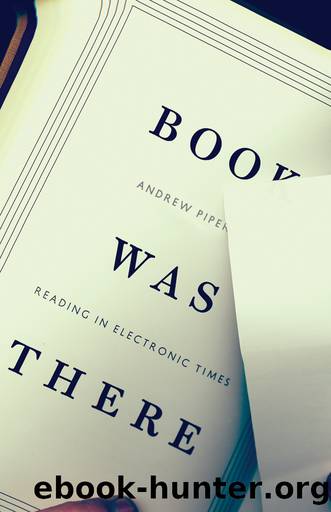Book Was There by Andrew Piper

Author:Andrew Piper
Language: eng
Format: epub
Publisher: The University of Chicago Press
Published: 2012-06-15T00:00:00+00:00
[FIGURE 5.5] Aram Bartholl, Dead Drops (2010). Courtesy of the artist.
Finally, genuine sharing is about taking care of something not your own once it has been given to you. Being shared with comes with an obligation. Unlike a gift, you are more of a custodian than an owner of a shared object. In creative terms, it would be the difference between the novels of someone like the German émigré writer W. G. Sebald, who meticulously records the stories of Jewish emigrants and their memories after the war using a complicated web of indirect discourse, and the many digital forms of the âremixâ or âmash-upâ today. In Sebald, someone elseâs story becomes interwoven into his own, but it still remains partially intact, never entirely his. Mashing, as the name viscerally tells us, lacks this sense of care or responsibility for something or someone else. It eschews commonality in the name of the commons.
I realize that criticizing remix culture and embracing DRM puts me on the wrong side of history (how old is this guy anyway?). But despite the grand claims of âeverything is socialâ today, there is remarkably little mutuality online. On the one hand, the history of books tells us this is as it should beâhaving ideas in common is extremely difficult. But the history of books also gives us a glimpse into a variety of practices that can help mitigate the shearing of reading, the way it divides us as much as it brings us together. Instead of more antisocial manifestoes or more paeans to free culture, we need greater attention to the contradictions inherent in what Emerson defined as true intellectual friendship: âWe will meet as though we met not, and part as though we parted not.â33
. . .
At the opening of his evocative essay on unpacking his library, Walter Benjamin suggested that one of the best ways to build a library of oneâs own is through inheritance.34 I often think about this when I look at my own library. Modest as it is (I am no book collector), will my children want all of these books when I am dead? What if they donât read German, or if they find that there are too few in French, or if they just donât want books anymore? Will my library be referred to, as was the case in one probate inventory from the seventeenth century, as âhis books and other trashâ?35
Whether personal or institutional, a library is a space of sharing. Books share space with other books, accruing value through their proximity. The âstackâ or âpileâ is one of the most fundamental ways that books have meaning for us. But in placing books on a shelf, owners are also sharing books with others. Look, says a bookshelf, here is a collection of my ideas.
A hard drive, on the other hand, is a curious kind of library. Instead of books, it is full of files, which are not stacked, but imbedded within one another. The hard drive is more like a law office.
Download
This site does not store any files on its server. We only index and link to content provided by other sites. Please contact the content providers to delete copyright contents if any and email us, we'll remove relevant links or contents immediately.
Cecilia; Or, Memoirs of an Heiress — Volume 1 by Fanny Burney(32559)
Cecilia; Or, Memoirs of an Heiress — Volume 2 by Fanny Burney(31957)
Cecilia; Or, Memoirs of an Heiress — Volume 3 by Fanny Burney(31943)
The Lost Art of Listening by Michael P. Nichols(7507)
Asking the Right Questions: A Guide to Critical Thinking by M. Neil Browne & Stuart M. Keeley(5778)
We Need to Talk by Celeste Headlee(5617)
On Writing A Memoir of the Craft by Stephen King(4947)
Dialogue by Robert McKee(4406)
Pre-Suasion: A Revolutionary Way to Influence and Persuade by Robert Cialdini(4235)
I Have Something to Say: Mastering the Art of Public Speaking in an Age of Disconnection by John Bowe(3892)
Elements of Style 2017 by Richard De A'Morelli(3351)
The Book of Human Emotions by Tiffany Watt Smith(3310)
Fluent Forever: How to Learn Any Language Fast and Never Forget It by Gabriel Wyner(3088)
Name Book, The: Over 10,000 Names--Their Meanings, Origins, and Spiritual Significance by Astoria Dorothy(2988)
Why I Write by George Orwell(2957)
Good Humor, Bad Taste: A Sociology of the Joke by Kuipers Giselinde(2952)
The Art Of Deception by Kevin Mitnick(2806)
The Grammaring Guide to English Grammar with Exercises by Péter Simon(2745)
Ancient Worlds by Michael Scott(2691)
